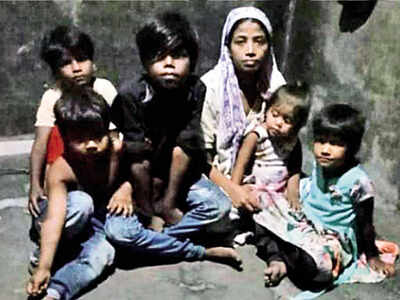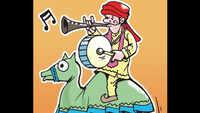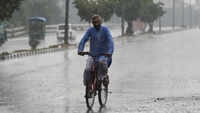
MUMBAI: Coronavirus has not been the only killer in this lockdown. Another fallout has been starvation or extreme lack of food, witnessed in distressful sights and reports of people in teeming slums of Kalwa, a distant north central suburb between Thane and Mumbra, chafing in hunger and despair.
Overcrowding, poor sanitation, hygiene-related illnesses — life was a struggle in labyrinthine shanties of Kalwa long before the virus came. The slum may have escaped the brunt of Covid-19 cases till now, but more than the virus still looming large, it is hunger they fear. Without work since lockdown, most residents who live a hand-to-mouth existence working in construction, cleaning and as domestic help and earn an average daily salary of Rs 140, are staring at an unsheltered future, their savings and food dwindling by the day.
Home to roughly 1.5 lakh residents, old-timers say the Kalwa slum community was birthed one tiny shanty at a time over two decades across a contentious land parcel that belonged to liquidated Mafatlal Industries. Its boundaries grew briskly, with the illegal settlement of migrants from UP, Bihar, Bengal and Karnataka looking for work in the city, and resettlement of slum-dwellers from other parts of Mumbai, after their homes had been razed in demolition drives.
While around 40,000 travelled back to their hometown following lockdown, as estimated by Gabriel Project, two young children suffocated to death in the back of an unventilated lorry after their parents paid for them to join relatives in UP. Many stayed back, too poor to afford travel and clinging to grassroots charities for essential food supplies as savings ran dry and foodstock depleted.
Shivratan Gupta (58), with a family of seven to feed, including a three-year-old granddaughter, is at his wits’ end trying to navigate survival. Shivratan, who migrated from a village in UP last year to escape crippling poverty and scavenged a living on local trains, selling chocolate and snacks, is starving and facing eviction from his one-room shack in Kalwa. As the trains sit still, so does he.
“These migrants came here to get out of extreme poverty in urban settings and now with the pandemic, they’re worse off,” says Jacob Sztokman, co-founder of Gabriel Project, which has been working in Kalwa for four years.
Jamila Bano Sheikh (30), a mother of five, has been fending house rent, food and school fees for her children, since her husband died two years ago in an accident. “I’m unable to sleep at night, petrified of catching the virus and leaving my children orphaned on the street,” she says.
“With the country opening up, many Kalwa residents hope their old jobs will be available again. This optimism encouraged around 5,000 to return, leaving their families behind,” says Sztokman.
Overcrowding, poor sanitation, hygiene-related illnesses — life was a struggle in labyrinthine shanties of Kalwa long before the virus came. The slum may have escaped the brunt of Covid-19 cases till now, but more than the virus still looming large, it is hunger they fear. Without work since lockdown, most residents who live a hand-to-mouth existence working in construction, cleaning and as domestic help and earn an average daily salary of Rs 140, are staring at an unsheltered future, their savings and food dwindling by the day.
Home to roughly 1.5 lakh residents, old-timers say the Kalwa slum community was birthed one tiny shanty at a time over two decades across a contentious land parcel that belonged to liquidated Mafatlal Industries. Its boundaries grew briskly, with the illegal settlement of migrants from UP, Bihar, Bengal and Karnataka looking for work in the city, and resettlement of slum-dwellers from other parts of Mumbai, after their homes had been razed in demolition drives.
While around 40,000 travelled back to their hometown following lockdown, as estimated by Gabriel Project, two young children suffocated to death in the back of an unventilated lorry after their parents paid for them to join relatives in UP. Many stayed back, too poor to afford travel and clinging to grassroots charities for essential food supplies as savings ran dry and foodstock depleted.
Shivratan Gupta (58), with a family of seven to feed, including a three-year-old granddaughter, is at his wits’ end trying to navigate survival. Shivratan, who migrated from a village in UP last year to escape crippling poverty and scavenged a living on local trains, selling chocolate and snacks, is starving and facing eviction from his one-room shack in Kalwa. As the trains sit still, so does he.
“These migrants came here to get out of extreme poverty in urban settings and now with the pandemic, they’re worse off,” says Jacob Sztokman, co-founder of Gabriel Project, which has been working in Kalwa for four years.
Jamila Bano Sheikh (30), a mother of five, has been fending house rent, food and school fees for her children, since her husband died two years ago in an accident. “I’m unable to sleep at night, petrified of catching the virus and leaving my children orphaned on the street,” she says.
“With the country opening up, many Kalwa residents hope their old jobs will be available again. This optimism encouraged around 5,000 to return, leaving their families behind,” says Sztokman.
Get the app








